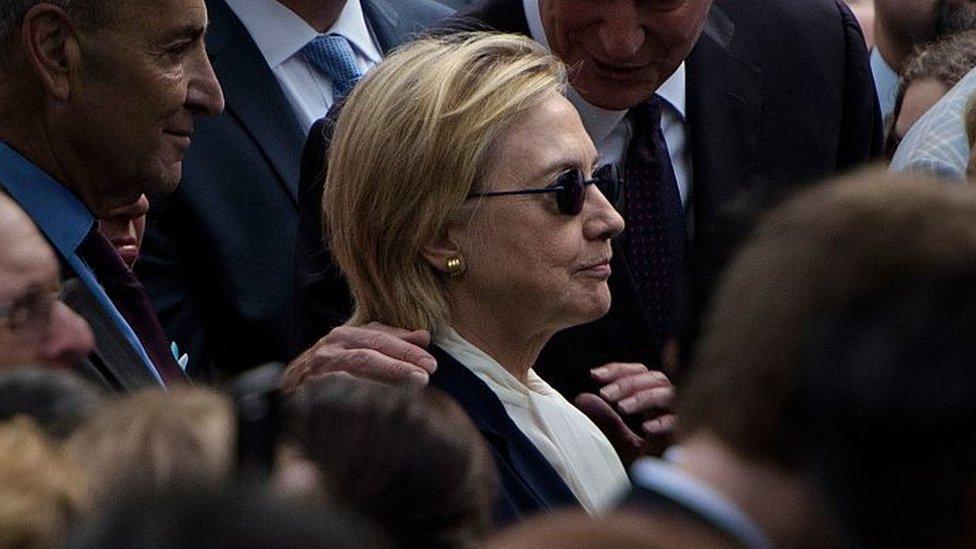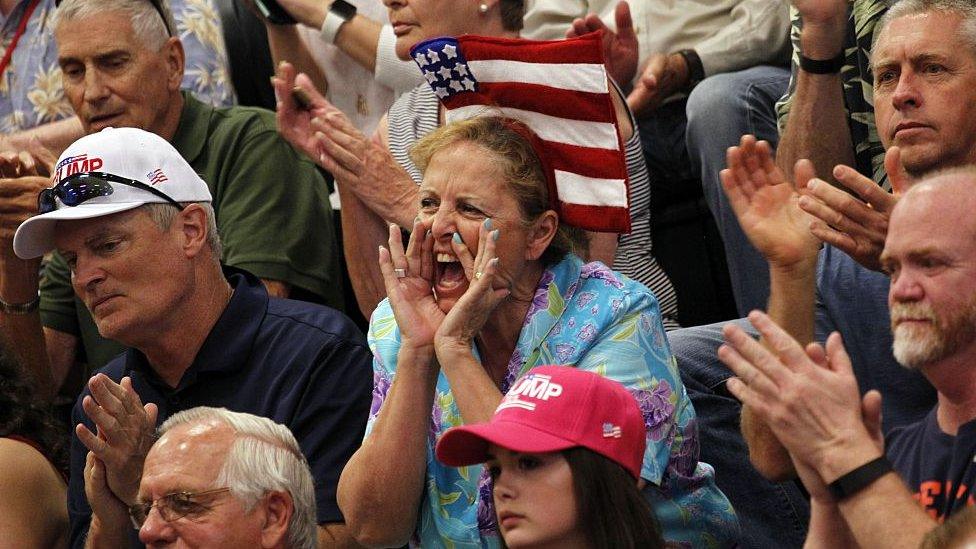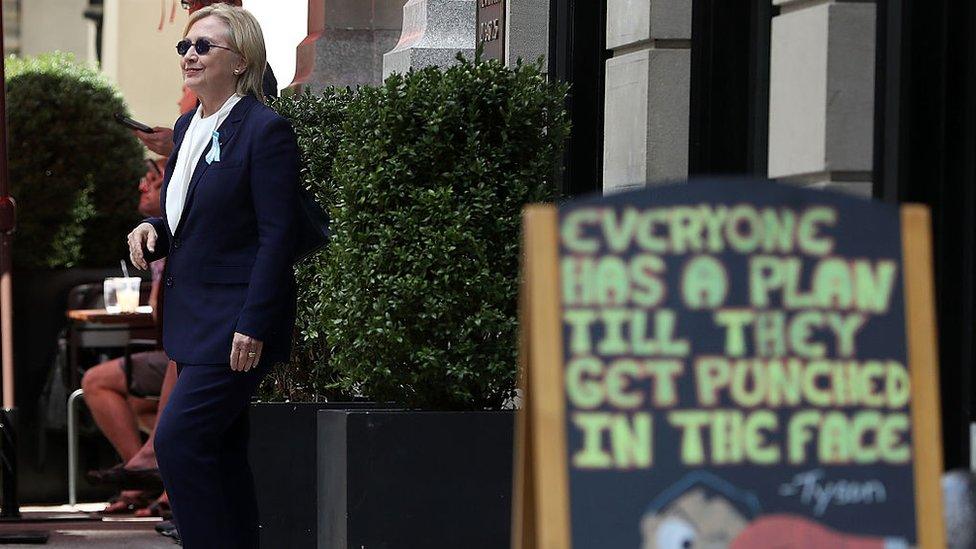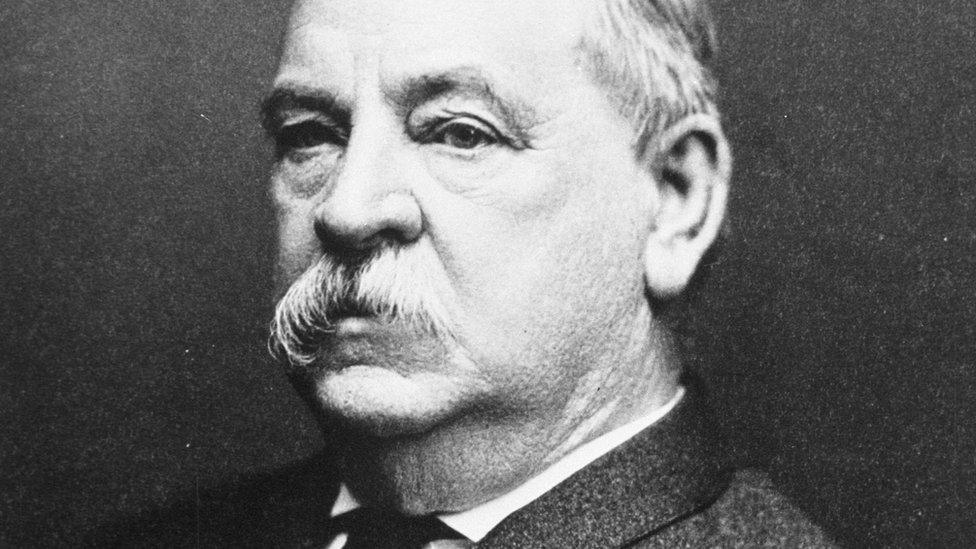Will Clinton pay for her terrible weekend?
- Published

The US presidential campaign doesn't take weekends off. For once, however, the spotlight is shining squarely on Hillary Clinton and not Donald Trump.
On back-to-back days the Democratic nominee made headlines - the first time, perhaps, intentionally. The second time was the kind of unpredictable event that all campaigns dread.
As with any political story, time - and the actions of the campaigns - will tell. Will Mrs Clinton's lumping of half of Mr Trump's supporters in a "basket of deplorables" alienate voters? Did her near collapse during Sunday's 9/11 memorial ceremonies make her health a political Achilles heel?
For the moment, there's plenty of cause for concern in the Clinton camp, as it reels to regain control of the news cycle.
As the saying goes, however, things are never as good as you think or as bad as they seem. The Democrat was riding high just a month ago, with pundits and prognosticators wondering just how big her election victory would be. Now comes the apparent trough. Will she - can she - rebound?
Here's a look at the two big stories of the weekend and why they may or may not be a significant blow to Mrs Clinton's presidential hopes.


The 'Basket of Deplorables'
Hillary Clinton and the "basket of deplorables" sounds more like a rejected Harry Potter book title than a political insult, but her dismissive line instantly drew comparisons to other recent political gaffes. In 2012 Mitt Romney was roundly criticised for his dismissal of half of Americans as being addicted to government support, and Barack Obama said some downtrodden Pennsylvanians cling to guns and religion in 2008.
Mrs Clinton had delivered an entire speech about racism, sexism and xenophobia within the Trump ranks several weeks ago, but her basket comment on Friday night made headlines the following day because she applied the label to fully half of Mr Trump's supporters. Given that he received 13 million votes in the Republican primary alone, that's a sizable number of Americans.
By Saturday afternoon, Mrs Clinton had partially walked back her comments, saying she regretted using the word "half". She stood by her characterisation that the Trump campaign was lifting up and giving voice to many deplorable individuals and groups, however.
Why it's a bundle of trouble: The Trump campaign has already cut an advert, external, which will air in four key battleground states, blasting Mrs Clinton for maligning millions of "hardworking people like you".
As Mrs Clinton herself acknowledged before making her comments, she was being "grossly generalistic" about her description. Any time a politician has to preface a comment with that kind of qualification, it's probably something she shouldn't be saying at all.
The gaffe could make Mrs Clinton look elitist and dismissive of some voters, alienating the kinds of working-class voters she needs to win states like Pennsylvania, Ohio and Michigan.
Candidates insult each other all the time - something voters largely shrug off. Start taking shots at the public, however, and voters start wondering if you're talking about them.
Why it's a basket of nothing: Unlike the Obama and Romney gaffes, which maligned otherwise decent people for receiving government subsidies, being religious or supporting gun rights, Mrs Clinton was condemning deplorable behaviour. While the "half" line was an inflammatory overgeneralisation, Mrs Clinton would probably be happy to have a debate over how many of Mr Trump's supporters are racists or xenophobes.
Already some on the left are citing examples of the extreme views of Mr Trump's "alt-right" supporters and providing statistical evidence they say supports Mrs Clinton's assertion. A majority, external of Trump's supporters, for instance, believe President Barack Obama is secretly Muslim. Nearly half, external say that blacks are "more violent" than whites.
Moreover, it's unclear exactly where Mrs Clinton's comments could damage her. Even in his darkest days after the Democratic convention, Mr Trump had around 40% support in national polls. Those voters are fully out of Mrs Clinton's reach.
The Democratic nominee's supporters probably agree with her characterisations of Mr Trump's legions of fans. Many probably think the number of deplorables is greater than half.
There's still a high number of undecided in many polls - voters who had shown signs of supporting Mrs Clinton in August but have wavered in recent days. Being told that many of Mr Trump's supporters are racists isn't likely to push them into the Republican side.


Clinton 'overheats'
Just as Democrats and Republicans were gearing up for the Battle of the Deplorables, the entire race was thrown in turmoil when Mrs Clinton made a mysterious exit from 9/11 memorial ceremonies in New York City.
At first the campaign said nothing. Then it said Mrs Clinton had "overheated" and was taken to her daughter's nearby apartment to recover. An amateur video showing the Democratic nominee walking unsteadily and apparently collapsing as she entered her van went viral on the internet.
Mrs Clinton, in better health, then appeared outside her daughter's apartment before departing to her home in Chappaqua, New York. Later that day, the campaign said Mrs Clinton had been diagnosed with pneumonia two days earlier. Toward the end of the evening it put out word that a scheduled Clinton trip to California had been cancelled.
Why it's a fall: Rumours about Mrs Clinton's health have been swirling in conservative circles for more than a year. In December 2014, Republican strategist Karl Rove suggested the Democrat had lingering brain damage from a concussion she received from a fall in 2012. In recent days Trump surrogates - including former New York Mayor Rudy Giuliani - had suggested Mrs Clinton was covering up a serious medical condition.
These conspiracy theories had been roundly dismissed in the mainstream media, and news outlets that did touch it - like NBC, which ran a story about Mrs Clinton's recurring coughing fits - were denounced by the Clinton campaign.
Now, however, Mrs Clinton's health is squarely a campaign issue. More than that, the way the Clinton campaign handled the story - at first keeping the media in the dark, then trotting the candidate in front of cameras to say all is well, then revealing a two-day-old pneumonia diagnosis - plays into perceptions that the Clintons are overly secretive.
This content is no longer available
"Antibiotics can take care of pneumonia," tweets, external former Obama campaign manager David Axelrod. "What's the cure for an unhealthy penchant for privacy that repeatedly creates unnecessary problems?"
What should be most concerning to the Clinton team is that the Trump campaign has managed to hold its tongue as the news unfolded, likely sensing that the story was damaging enough on its own. In his first public comments on Monday morning, for instance, Mr Trump only said that he hopes Mrs Clinton makes a full recovery.
Presidential campaigns go through great efforts to portray their candidate as healthy and full of vigour. Mr Obama played basketball with his staff. George W Bush cleared brush and jogged on his Texas ranch. Presidents who had health troubles concealed their weaknesses. John Kennedy, who had debilitating back pain among other ailments, played football with family members in front of the cameras. Franklin D Roosevelt was loath to be seen in his wheelchair.
At 68, Mrs Clinton is particularly susceptible to concerns about her health (as is 70-year-old Trump). She has the additional challenge of being the first female presidential nominee from a major political party - and may have to face biases within the electorate over whether a female candidate is sufficiently "strong", regardless of her age.
Why it's a stumble: Mrs Clinton will be under intense scrutiny over the coming weeks, as everyone looks for signs of lingering weakness. If she returns to her normal campaign schedule without incident after a few days of recuperation, she will go a long way towards putting health concerns to bed.
There may even be an unexpected benefit to Sunday's episode, as Mrs Clinton could gain sympathy from voters for enduring an illness and attempting to slog through to attend the 9/11 memorials. She was boosted prior to the New Hampshire primary in 2008, for instance, when she chocked back tears talking about her campaign efforts. It gave her an emotional connection to Americans that she often lacks.
Hillary Clinton health concerns 'are sexist', says former New York Times editor
No matter what happens in the coming weeks, the series of presidential debates starting on 26 September have taken on the utmost importance. Polls showed the race between Mrs Clinton and Mr Trump already tightening, and now Americans will be even more inclined to watch to see how the Democratic nominee holds up for 90 minutes on the stage.
In a way it may help her lower expectations for her performance. Mr Trump was already thought to have a low bar given his penchant for intemperate, ill-conceived remarks. Mrs Clinton may only have to stay upright on stage for her appearance to be deemed a success.
- Published12 September 2016

- Published8 September 2016
- Published7 September 2016